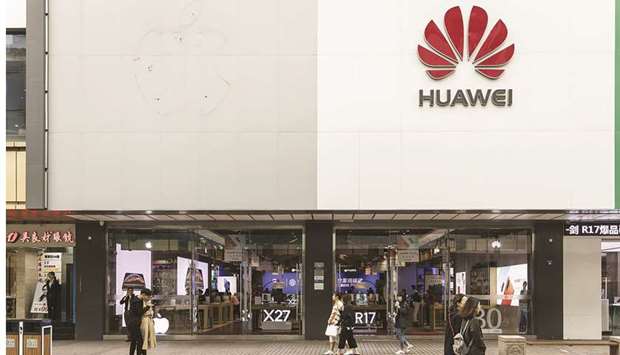*Users say US tech giants scared of Huawei success
*US firms too to take hit from Trump sanctions
*Top executive says dispute is about trade, not security
*Stocks slide as worries about Huawei fallout mount
Huawei on Monday pledged to continue to build a safe and sustainable software ecosystem, in order to provide the best experience for all users of its products globally.
The assurance came after the Trump administration on Friday blacklisted Huawei and threatened to cut it off from the US software and semiconductors it needs to make its products.
Monday Google barred it from updates to the Android operating system.
In a statement issued in Doha , the Chinese technology major said it has made substantial contributions to the development and growth of Android around the world. "As one of Android’s key global partners, we have worked closely with their open-source platform to develop an ecosystem that has benefitted both users and the industry.
"Huawei will continue to provide security updates and after sales services to all existing Huawei and Honor smartphone and tablet products covering those have been sold or still in stock globally.
"We will continue to build a safe and sustainable software ecosystem, in order to provide the best experience for all users globally," the statement added.
Hundreds of millions of smartphone users will be affected by Google's decision to sever its Android operating system ties with Huawei.
Users took to the social media to express their frustrations, with some saying 'Apple, Google and Samsung are threatened by Huawei and now they are playing dirty' while others said they stood by Huawei in the row between the US and China.
Some others opined that China should ban all Apple products as a tit for tat response.
The decision, in the midst of a US trade war with China, means that Huawei users will start losing access to Google's proprietary services such as Gmail and Maps, and be shut out of future upgrades to Android on their phones.
The move by the California internet giant on the software front was compounded by news that US chipmakers have stopped supplying Huawei, hitting the hardware of its phones.
Huawei sold nearly 203mn phones last year, up from 150mn in 2017, according to data tracking firm Gartner, overtaking Apple to threaten Samsung atop the global charts.
For the first quarter of 2019, before its recent run-in with President Donald Trump's administration, Huawei sold 59mn handhelds, IDC calculated.
Those users risk losing access to important upgrades to Android released by Google in future, although for now Huawei said it would continue to provide security updates.
The Chinese company will only be able to access software patches and distribute them from Android's open source project, not proprietary information retained by Google, meaning that apps on Huawei phones could become unusable.
But the tough sanctions imposed on Huawei by Trump could deal a blow to the many US firms that make up the Chinese tech giant's supply chain.
American firms last year sold an estimated $11bn worth of components to Huawei.
US-based chipmakers Intel, Qualcomm, Broadcom and Xilinx have indicated they would halt shipments to the Chinese firm which is the world's number two smartphone maker and a leader in telecom infrastructure and super-fast 5G networks.
Microsoft, which supplies the Windows operating system for many Huawei devices, did not respond to an AFP query on how the order might impact the Redmond, Washington-based firm.
Bob O'Donnell of the consultancy Technalysis Research said any ban would almost certainly affect Microsoft.
"Any version of Windows comes from Microsoft, since there is no open-source version."
The US ban on sharing technology with Huawei was a "cynically timed" blow in the escalating trade war between the US and China, the Chinese firm's top executive in the UK has said.
Speaking to BBC Radio 4's World At One, Huawei's executive vice-president in the UK, Jeremy Thompson, said the dispute was about trade, not security.
"We're in the middle of a trade war between two big countries so the timing of this is to inflict maximum hurt on our organisation. We're a football in between this trade war," he said.
Global equity markets fell on Monday as the US crackdown on Huawei led chipmaker stocks in Europe and on Wall Street to slide on fears of a widening trade war, while the dollar was steady ahead of fresh insight on the Federal Reserve policies.
Asian shares managed to reverse some of last week's losses after Washington said it would lift tariffs in North America, but fresh Chinese trade comments sank that sentiment.
China accused the United States of harboring "extravagant expectations" for a trade deal, underlining the gulf between the two sides as the US action last week against Huawei began to hit the global tech sector.
Apple Inc slumped 3.4%, weighing the most on the three main indexes and driving down the S&P 500 technology sector 1.51%, the biggest decliner among the six S&P sectors trading lower.
US suppliers of Huawei, including Qualcomm , Micron Technology and Broadcom Inc, fell between 3.2% and 5.3%, while the Philadelphia Semiconductor Index slid 3.19%, its lowest level in over two months.
"This whole thing is going to have an impact on earnings, consumers will probably shift buying habits and it will also turn up pressure on the US and China to reach a deal sooner," said Robert Pavlik, chief investment strategist and senior portfolio manager at SlateStone Wealth LLC in New York.
European stocks also recorded broad-based losses , as the row rekindled concerns about worsening global trade and wilted the continent's trade-exposed tech and auto stocks.
Global risk appetite was jolted after Reuters reported Alphabet Inc's Google suspended some business with Huawei, while Apple Inc supplier Lumentum Holdings Inc said it had discontinued all shipments to Huawei.

